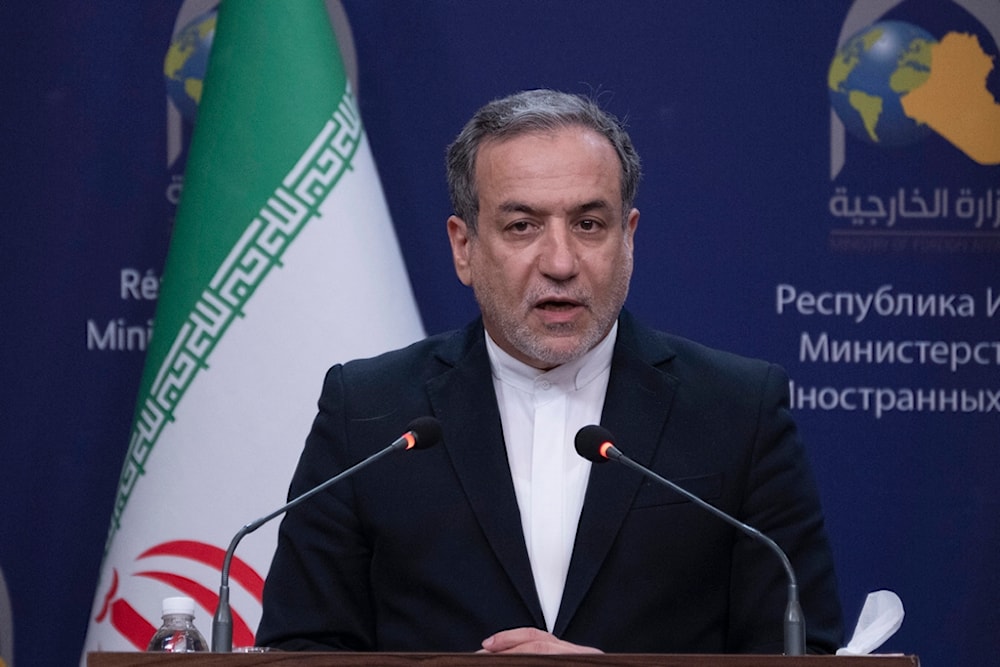Iran yet to respond to Trump letter on nuclear talks, FM says
Iranian Foreign Minister Abbas Araghchi reveals that his country is yet to respond to the letter sent by US President Donald Trump about its nuclear program.
-

Iranian Foreign Minister Abbas Araghchi speaks during a news conference with his Iraqi counterpart Fouad Hussein, and Syrian Foreign Minister Bassam Sabbagh, following a meeting, in Baghdad, Iraq, Friday, December 6, 2024. (AP)
Iranian Foreign Minister Abbas Araghchi announced that Iran has yet to respond to the letter sent by US President Donald Trump about Iran's nuclear program. However, he said a reply was being prepared and would be submitted through the appropriate channels soon.
"We have not yet responded to the US letter, and the response to this letter is being prepared and will be submitted soon through the appropriate channels," Araghchi underlined.
Speaking at a joint press conference with Armenian Foreign Minister Ararat Mirzoyan in Yerevan, Araghchi reiterated that Iran will not engage in direct negotiations with the US under conditions of maximum pressure, military threats, and increased sanctions. However, he confirmed that talks with three European countries remain ongoing, affirming Iran's commitment to diplomacy.
The correspondence, which Trump announced on March 7, was sent to Ayatollah Sayyed Ali Khamenei amid the administration's continued "maximum pressure" campaign on Iran while also expressing an interest in negotiations.
Foreign Ministry spokesperson Esmaeil Baqhaei clarified that Tehran has no plans to make the letter public, noting that media speculation does not necessarily reflect its content.
"Iran's response to this correspondence will be made" through diplomatic channels after a thorough review, he said.
Iran supports Armenia-Azerbaijan peace treaty
Araghchi welcomed the agreement between Armenia and Azerbaijan on the text of a peace treaty, encouraging both sides to move forward with its signing. He stressed that Iran supports economic cooperation and trade route development, provided that it respects territorial integrity.
"Iran opposes any geopolitical changes and alterations to international borders," he stated, reaffirming Tehran’s stance on regional sovereignty.
The Iranian and Armenian foreign ministers also discussed expanding bilateral relations, with Araghchi highlighting positive trends in trade, economic cooperation, tourism, and cultural exchanges.
He emphasized that stability in the Caucasus is crucial and that the peace agreement between Armenia and Azerbaijan would reduce the risk of escalating tensions in the region.
US seeking to pull in Azerabaijan
An analysis by Responsible Statecraft has highlighted growing efforts in the US and the Israeli occupation to integrate Azerbaijan into the Abraham Accords, a move that appears aimed at escalating pressure on Iran.
The report, published Monday, suggests that while Azerbaijan already enjoys strong ties with the Israeli occupation, its formal inclusion in the accords could serve to deepen trilateral cooperation with the US, potentially entangling Washington in new geopolitical tensions.
The analysis notes that a campaign advocating for Azerbaijan’s inclusion has gained momentum in recent weeks. Influential figures, including rabbis with close ties to former President Donald Trump’s administration, have endorsed the move, and major publications such as The Wall Street Journal and Forbes have amplified the message. The Israeli think tank Begin-Sadat Center has also argued that Baku would be a fitting addition to the accords.
However, Responsible Statecraft questions the necessity of this push, given that Azerbaijan is already a key Israeli ally, supplying up to 40% of the occupation's oil and receiving advanced weaponry that played a decisive role in its wars against Armenia over Nagorno-Karabakh. The report suggests that the real motivation behind the effort is to align US policy more closely with Israeli-Azerbaijani interests, particularly in countering Iran.

 3 Min Read
3 Min Read








